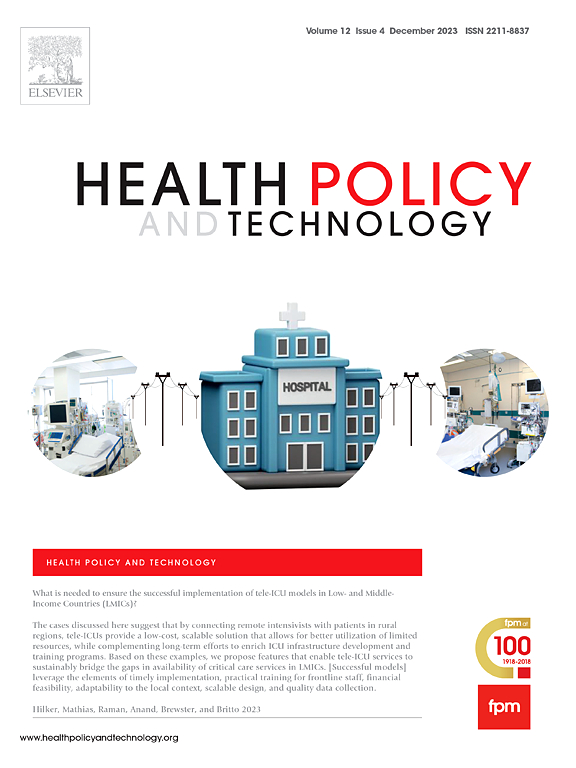探讨临床人工智能系统的政策法规:来自慢性病患者的观点
IF 3.7
3区 医学
Q1 HEALTH POLICY & SERVICES
引用次数: 0
摘要
人工智能(AI)已成为医疗保健领域的变革力量,为加强患者护理、提高效率和降低成本提供了机会。然而,患者的观点对人工智能技术的接受和实施有很大影响,但仍未得到充分研究。本研究探讨慢性病患者对临床人工智能系统的看法,重点关注他们的担忧、政府参与、对潜在人工智能错误的问责,以及人工智能和医生建议之间的偏好。这些见解对于定制人工智能技术以满足患者的需求和期望以及更好地吸引患者采用新技术至关重要。方法对140例慢性疾病患者进行在线开放式问卷调查,从四个方面探讨临床人工智能的应用前景。使用归纳主题分析方法对数据进行系统编码和分析,以确定紧急主题。结果大多数受访者对人工智能在医疗领域的应用表示担忧(92.86%),其中最担心的是缺乏人情感(22.86%)、潜在的人工智能偏见和公平性(16.43%)和过度依赖人工智能(16.43%)。关于潜在治疗损害的责任,37.14%的参与者认为医生应该承担责任,16.43%的参与者认为人工智能开发者应该负责,1.42%的参与者认为政府应该负责。此外,44.57%的人认为利益相关者应该分担责任。在政府角色方面,51.43%的人认为监管和监督是主要职责,而8.57%的人认为政府在人工智能医疗中没有作用。最后,大约80%的患者更喜欢护理提供者的治疗建议,而不是人工智能。结论研究结果表明,患者正在寻找技术和人类参与之间的平衡方法,具有明确的责任和适当的监管。尽管大多数人更喜欢人类医生,但对人工智能潜力的开放态度表明了一种不断发展的看法。这突出表明,需要制定包容性治理和以患者为中心的战略,解决这些问题,以确保人工智能在医疗保健领域的成功整合。摘要本研究探讨慢性患者在医疗保健中使用人工智能的意见。研究发现,虽然患者欣赏人工智能的潜在好处,但他们担心失去人类医生的个人接触、潜在的偏见和对技术的过度依赖。他们还认为,人工智能错误的责任应该由医生、开发人员和政府共同承担。研究结果强调了将人工智能纳入医疗保健的必要性,需要制定明确的法规,并关注患者安全,以建立信任和接受度。本文章由计算机程序翻译,如有差异,请以英文原文为准。
Exploring policy and regulations of clinical AI systems: Views from patients with chronic diseases
Background
Artificial Intelligence (AI) has become a transformative force in healthcare, offering opportunities to enhance patient care, improve efficiency, and reduce costs. However, patients' perspectives, which greatly influence the acceptance and implementation of AI technologies, remain under-researched.
Objective
This study explores patients with chronic conditions’ perspectives on clinical AI systems, focusing on their concerns, government involvement, accountability for potential AI error, and preferences between AI and doctor recommendations. These insights are crucial for tailoring AI technologies to meet patients' needs and expectations and better engage patients in adopting new technologies.
Method
This study conducted an online open-ended survey with valid responses from 140 patients with chronic conditions, exploring four aspects of clinical AI perspectives. The data was systematically coded and analyzed using an inductive thematic analysis approach to identify emergent themes.
Result
The majority of participants expressed concerns about the implementation of AI in healthcare (92.86 %), with the top worries including lack of human touch (22.86 %), potential AI bias and fairness (16.43 %), and over-dependence on AI (16.43 %). Regarding responsibility for potential treatment damages, 37.14 % of participants believed that physicians should bear the responsibility, 16.43 % considered AI developers accountable, and 1.42 % viewed the government as the responsible party. Furthermore, 44.57 % suggested that responsibility should be shared among stakeholders. In terms of government role, 51.43 % saw regulation and monitoring as key responsibilities, while 8.57 % perceived no government role in AI healthcare. Finally, around 80 % of patients preferred treatment recommendations from care providers over AI.
Conclusion
The findings suggest patients are looking for a balanced approach between technology and human involvement, with clear accountability and proper regulation. Though most prefer human doctors, an openness to AI's potential indicates an evolving perception. This underscores the need for a governance-inclusive and patient-centric strategy that addresses these aspects to ensure successful AI integration in healthcare.
Lay Summary
This study explores the opinions of chronic patients on using AI in healthcare. It found that while patients appreciate the potential benefits of AI, they have concerns about losing the personal touch of human doctors, potential biases, and over-reliance on technology. They also believe that accountability for AI errors should be shared among doctors, developers, and the government. The findings highlight the need for careful integration of AI in healthcare, with clear regulations and a focus on patient safety to build trust and acceptance.
求助全文
通过发布文献求助,成功后即可免费获取论文全文。
去求助
来源期刊

Health Policy and Technology
Medicine-Health Policy
CiteScore
9.20
自引率
3.30%
发文量
78
审稿时长
88 days
期刊介绍:
Health Policy and Technology (HPT), is the official journal of the Fellowship of Postgraduate Medicine (FPM), a cross-disciplinary journal, which focuses on past, present and future health policy and the role of technology in clinical and non-clinical national and international health environments.
HPT provides a further excellent way for the FPM to continue to make important national and international contributions to development of policy and practice within medicine and related disciplines. The aim of HPT is to publish relevant, timely and accessible articles and commentaries to support policy-makers, health professionals, health technology providers, patient groups and academia interested in health policy and technology.
Topics covered by HPT will include:
- Health technology, including drug discovery, diagnostics, medicines, devices, therapeutic delivery and eHealth systems
- Cross-national comparisons on health policy using evidence-based approaches
- National studies on health policy to determine the outcomes of technology-driven initiatives
- Cross-border eHealth including health tourism
- The digital divide in mobility, access and affordability of healthcare
- Health technology assessment (HTA) methods and tools for evaluating the effectiveness of clinical and non-clinical health technologies
- Health and eHealth indicators and benchmarks (measure/metrics) for understanding the adoption and diffusion of health technologies
- Health and eHealth models and frameworks to support policy-makers and other stakeholders in decision-making
- Stakeholder engagement with health technologies (clinical and patient/citizen buy-in)
- Regulation and health economics
 求助内容:
求助内容: 应助结果提醒方式:
应助结果提醒方式:


